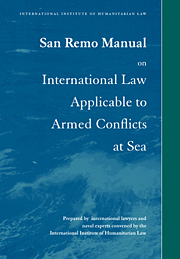 San Remo Manual on International Law Applicable to Armed Conflicts at Sea
San Remo Manual on International Law Applicable to Armed Conflicts at Sea Book contents
- Frontmatter
- Contents
- FOREWORD
- SAN REMO MANUAL
- EXPLANATION
- Introduction
- List of abbreviations
- Part I General provisions
- Part II Regions of operations
- Part III Basic rules and target discrimination
- Part IV Methods and means of warfare at sea
- Part V Measures short of attack: interception, visit, search, diversion and capture
- Part VI Protected persons, medical transports and medical aircraft
- INDEX
Part V - Measures short of attack: interception, visit, search, diversion and capture
Published online by Cambridge University Press: 04 August 2010
- Frontmatter
- Contents
- FOREWORD
- SAN REMO MANUAL
- EXPLANATION
- Introduction
- List of abbreviations
- Part I General provisions
- Part II Regions of operations
- Part III Basic rules and target discrimination
- Part IV Methods and means of warfare at sea
- Part V Measures short of attack: interception, visit, search, diversion and capture
- Part VI Protected persons, medical transports and medical aircraft
- INDEX
Summary
Preliminary remarks
Part V deals with what traditionally used to be the law of prize. However, the measures belligerents may take against enemy and neutral vessels and aircraft according to the subsequent paragraphs are not only those of economic warfare at sea. The title to Part V has been changed to ‘measures short of attack’ in order to clarify this.
According to the rules laid down in Part V, enemy as well as neutral vessels and aircraft, under certain circumstances, may be captured. That kind of capture needs to be distinguished from capture according to paragraph 40. Enemy merchant vessels and civil aircraft that are characterised as military objectives may not only be attacked but, a fortiori, also captured. In that case property passes as soon as capture is completed. The same holds true as regards neutral merchant vessels and aircraft that are liable to attack. In other words, objects liable to attack may in any event be captured. Property passes simultaneously with the completion of capture.
The applicability of the definition of military objectives has not superseded the rules governing economic warfare at sea that remain applicable qua customary international law. Hence, according to the rules laid down in Part V, enemy as well as neutral merchant vessels and civil aircraft may be captured in certain cases even if they are not liable to attack. However, if they are captured and do not qualify as objects liable to attack, they are captured for adjudication as prize.
- Type
- Chapter
- Information
- San Remo Manual on International Law Applicable to Armed Conflicts at SeaInternational Institute of Humanitarian Law, pp. 187 - 222Publisher: Cambridge University PressPrint publication year: 1995


